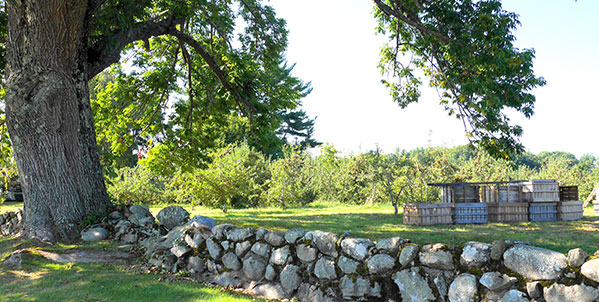Agriculture
 The RPC region has a long tradition of agricultural activity
that has been under continuous development pressure since the late 1960’s. The conversion of farmlands to housing has
been a regional trend resulting in the loss of thousands of acres of previously
farmed land. It has long been a land use policy for the Commission to advocate
for the protection of high quality farmlands and to actively advocate minimal
regulation of agricultural activities within member communities. As the table below indicates the region saw a
loss of nearly two thirds of its active agricultural lands from 1962 to
2015.
The RPC region has a long tradition of agricultural activity
that has been under continuous development pressure since the late 1960’s. The conversion of farmlands to housing has
been a regional trend resulting in the loss of thousands of acres of previously
farmed land. It has long been a land use policy for the Commission to advocate
for the protection of high quality farmlands and to actively advocate minimal
regulation of agricultural activities within member communities. As the table below indicates the region saw a
loss of nearly two thirds of its active agricultural lands from 1962 to
2015.
The dramatic change to the landscape away from agricultural endeavors and towards suburban residential development is obvious to any residents that have lived here for the duration of this time period. There is however much to take pride in regarding agricultural activity in the RPC region. As shown on the table the acres of land in Farmsteads has actually increased over this same time period by nearly 30%. This means that although the agricultural operations are smaller today, there are actually more of them then existed in 1962.
The State of New Hampshire and Rockingham County in particular have seen huge advances in the success of smaller farms. The State of New Hampshire leads the nation in agricultural direct sales and in the number of organic operators. In 2018, Rockingham County ranked second nationwide for direct sales from farmers to customers.
Agricultural Land Use in the RPC Region
| Land Use (acres) | 1962 | 1974 | 1998 | 2005 | 2010 | 2015 |
| Active Agriculture | 26,052 | 17,803 | 10,822 | 9,777 | 9,800 | 9.705 |
| Farmsteads | 840 | 689 | 139 | 1,062 | 1,088 | 1,131 |
RPC Agricultural Activity
The RPC has been very involved with agricultural issues for years; most recently working in Stratham with a town-wide group to prepare agriculture-friendly zoning ordinance amendments for town meeting. In March 2016, RPC held an educational forum for RPC Commissioners, presented by Attorney Amy Manzelli, to explain the recent NH Supreme Court decision regarding agritourism (presentation available below). At that same forum, a panel discussion about the benefits and challenges of municipal regulation of agriculture (presentation available below) was held. Among the panelists were Lorraine Merrill, the NH Commissioner of Agriculture and a dairy farmer from Stratham; John Hutton a farmer and owner of Coppal House Farm in Lee as well as a long-time member of the Stratham Planning Board and Glenn Coppelman, a long time RPC commissioner, tree farmer and member of the NH Senate Committee working on refining the State definition of agritourism in light of the NH Supreme Court decision.
- Right to Farm and Agritourism (PDF) - Amy Macnzelli, Esq. BCM Environmental and Land Law, PLLC (March 2016)
- Benefits and Challenges of Municipal Regulation of Agriculture (PDF) - Lorraine Merrill, Commissioner NH Department of Agriculture, Markets and Food.
Resources
- Legal Guide for New Hampshire Agricultural Producers (PDF)- UNH Cooperative Extension (January 2018)
- Local Regulation of Agriculture Tool Kit (PDF) - NH Coalition for Sustaining Agriculture (December 2017)
- Growing Local: A Community Guide to Planning for Agriculture and Food Systems (PDF) - American Farmland Trust (2017)

